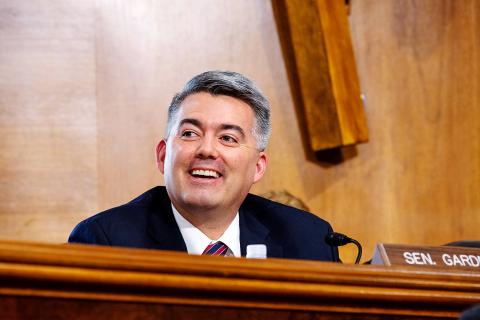Four US senators on Thursday reintroduced a draft bill to ensure that Taiwan is recognized internationally, as China increases efforts to limit Taipei’s participation on the global scene and poach its diplomatic allies.
US senators Cory Gardner, Marco Rubio, John Cornyn and Chris Coons renewed efforts to pass the Taiwan Allies International Protection and Enhancement Initiative Act, or the TAIPEI Act, which would require the US government to engage with governments worldwide in a bid to support Taiwan’s diplomatic recognition and strengthen unofficial ties with Taiwan.
The bill, first introduced in September last year, says that 90 days after its enactment and every 180 days thereafter the “secretary of state or a designee of the secretary shall submit to the appropriate congressional committees a report on actions taken by the US to reaffirm and strengthen Taiwan’s international alliances around the world.”

Photo: Bloomberg
The number of Taiwan’s diplomatic allies has fallen to 17 since President Tsai Ing-wen (蔡英文) took office and China lured the Gambia, Sao Tome and Principe, Panama, the Dominican Republic, Burkina Faso and El Salvador away, the bill says, adding that it would authorize the US Department of State to downgrade ties with any government that take actions unfavorable to Taiwan, as well as suspending or adjusting foreign assistance to such governments.
According to the draft, the US government should help Taiwan gain participation in international organizations, either as a member or an observer, and express its support for Taiwan’s participation on the global stage when interacting with Beijing.
The TAIPEI Act continues Washington’s commitment to Taiwan’s security by conducting “regular transfers of defense articles to Taiwan that are tailored to meet the existing and likely future threat” from China.
It also mentions the Taiwan Travel Act, which was signed into law by US President Donald Trump on March 16 last year to encourage mutual visits between Taiwanese and US officials.
“The US should use every tool to support Taiwan’s standing on the international stage,” Gardner said in a statement issued by the senators who sponsored the bill.
“This bipartisan legislation demands a whole-of-government approach to stand up to China’s bullying tactics and will send a strong message to nations that there will be consequences for supporting Chinese actions that undermine Taiwan,” he said.
Rubio said in the statement that he was proud to join his colleagues in reintroducing the legislation that reaffirmed the US’ commitment to its relationship with Taiwan and would allow the department to take diplomatic action against governments that alter diplomatic relations with Taiwan in favor of China.
“China’s efforts to isolate Taiwan by bullying and pressuring countries, especially in our own hemisphere, cannot go unanswered,” Rubio said.
There was strong, bipartisan support for Taiwan’s free-market democracy and its diplomatic relationships around the world, Coons said, adding that the bill confirmed that.
“Taiwan is a success story in its region, and both now and in the future, the US must continue to emphasize the strength of US-Taiwan ties and maintain the status quo regarding Taiwan’s place in the international community,” Coons said.

An essay competition jointly organized by a local writing society and a publisher affiliated with the Chinese Communist Party (CCP) might have contravened the Act Governing Relations Between the People of the Taiwan Area and the Mainland Area (臺灣地區與大陸地區人民關係條例), the Mainland Affairs Council (MAC) said on Thursday. “In this case, the partner organization is clearly an agency under the CCP’s Fujian Provincial Committee,” MAC Deputy Minister and spokesperson Liang Wen-chieh (梁文傑) said at a news briefing in Taipei. “It also involves bringing Taiwanese students to China with all-expenses-paid arrangements to attend award ceremonies and camps,” Liang said. Those two “characteristics” are typically sufficient

A magnitude 5.9 earthquake that struck about 33km off the coast of Hualien City was the "main shock" in a series of quakes in the area, with aftershocks expected over the next three days, the Central Weather Administration (CWA) said yesterday. Prior to the magnitude 5.9 quake shaking most of Taiwan at 6:53pm yesterday, six other earthquakes stronger than a magnitude of 4, starting with a magnitude 5.5 quake at 6:09pm, occurred in the area. CWA Seismological Center Director Wu Chien-fu (吳健富) confirmed that the quakes were all part of the same series and that the magnitude 5.5 temblor was

The brilliant blue waters, thick foliage and bucolic atmosphere on this seemingly idyllic archipelago deep in the Pacific Ocean belie the key role it now plays in a titanic geopolitical struggle. Palau is again on the front line as China, and the US and its allies prepare their forces in an intensifying contest for control over the Asia-Pacific region. The democratic nation of just 17,000 people hosts US-controlled airstrips and soon-to-be-completed radar installations that the US military describes as “critical” to monitoring vast swathes of water and airspace. It is also a key piece of the second island chain, a string of

The Central Weather Administration has issued a heat alert for southeastern Taiwan, warning of temperatures as high as 36°C today, while alerting some coastal areas of strong winds later in the day. Kaohsiung’s Neimen District (內門) and Pingtung County’s Neipu Township (內埔) are under an orange heat alert, which warns of temperatures as high as 36°C for three consecutive days, the CWA said, citing southwest winds. The heat would also extend to Tainan’s Nansi (楠西) and Yujing (玉井) districts, as well as Pingtung’s Gaoshu (高樹), Yanpu (鹽埔) and Majia (瑪家) townships, it said, forecasting highs of up to 36°C in those areas